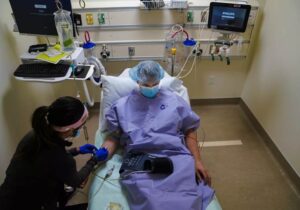All Caroline wanted was a pre-surgery consultation. The opportunity to meet with the surgeon scheduled to perform her husband’s eye surgery. She was told ‘No.’ The doctor wasn’t available for pre-surgery consultation.
As a patient advocate, I bristled at the perceived arrogance and the rigidity of this physician. What type of surgeon would refuse to meet with the patient, and those responsible for caring for that patient? How does a surgeon get away with this practice?
Reasons for Pre-Surgery Consultation
Scheduling the eye surgery prompted a number of concerns for Caroline:
- Necessity of the surgery given her husband’s age?
- Consequences if the surgery was postponed or cancelled?
- What to anticipate for recovery after surgery?
Contacting the physician’s office with these concerns, Caroline was told the surgeon would not meet with them. The office did propose an option of meeting with a surrogate (a nurse? a patient liaison?) from the office. Surrogates are not the same (neither positive or negative, just not the same) as meeting with the physician.
I first heard about Caroline’s dilemma in my writing critique group. During the past few years, I’ve immersed myself in the experiences of those with serious health challenges. My interviews with patients have translated into writing about these experiences, and I am now compiling these narratives into a book. At one critique meeting, Caroline, a spry woman in her eighties mentioned her husband’s eye surgery.
Pre-Surgery Questions and Concerns
Caroline was frustrated and she shared this frustration with the group. Caroline questioned whether or not to go forward with the appointment. There are many reasons patients may be afraid to speak up with doctors. Her big concern, was the surgery appropriate given the age of her husband and her husband’s other health issues.
Clearly, some event triggered the scheduling of the procedure. However, the couple’s internal medicine doctor felt such surgery was not necessary based on the husband’s health and age. Caroline wanted to discuss these concerns with the eye surgeon. Additionally, she just wanted an opportunity to meet the person performing surgery on her husband.
Caroline’s questions and concerns are legitimate. Research shows that almost 1 in 3 Medicare patients¹ will have surgery in the year before they die. And surgery performed on seniors may not always lead to an improvement in the quality of life². Furthermore, seniors do not recover as quickly from anesthesia. The recovery rate, the body’s ability to mend, is often slower.
When surgery is recommended, conversations about the quality vs. quantity of life are appropriate. Here are some concerns to discuss with a surgeons during a pre-surgery consultation:
- Clarify the reason for surgery
- Ask for an explanation of what will happen during surgery
- Request information on what to expect after surgery:
- Recovery rates
- Side effects
- Long-term prognosis
Every patient has the right to meet with the surgeon and have these questions answered.
Options When A Surgeon Is MIA
When a surgeon refuses a pre-surgery consultation, there are a few options available to caretakers and patients in this situation. Here are some potential paths:
- Insist on a meeting. Inform the office of your concerns. Underscore a reluctance to move forward with the surgery without such a meeting.
- Cons: Patients and caretakers are often hesitant to strike a hard line with physicians.
- Pros: The surgeon may just meet with you. Be sure to bring your list of questions/concerns with you to the meeting and take notes.
- Meet with the surrogate. Press hard for answers to all your questions and concerns.
- Be sure to bring a list of all questions/concerns to the meeting
- Bring someone with you to help navigate the conversation
- Take notes during the meeting.
- Review your understanding of the explanations before leaving the meeting.
- Review your understanding of next steps before leaving the meeting.
- Cancel the surgery. Find another surgeon if the surgery is necessary AND/OR will improve the quality of life.
Surgeons are highly trained experts in their respective specialties. These skills, however, should not empower arrogance and a disregard for patients’ concerns. [Many physicians have found better ways to communicate with patients.] If the surgeon will not meet with you, perhaps this is not the physician to entrust with your care and well-being.
¹Kwok, A.C. MD, Semel, M.E. MD, Lipsitz, S.R. ScD, Bader, A.M. MD, Barnato, A.E. MD, Gawande, A.A. MD. The Intensity and Variation of Surgical Care at the End of Life: A Retrospective Cohort Study. The Lancet, October 15th, 2011; 378(9800): 1408-1413.
²Nabozny, M.J. MD, Kruser, J.M. MD, Steffens, N.M. MPH, Brasel, K.J. MD, MPh, Campbell, T.C. MD, Gaines, M.E. JD, LLM, Schwarze, M.L., MD, MPP. Constructing High-Stakes Surgical Decisions: It’s Better to Die Trying. Ann Surg. 2016 January; 263(1): 64-70.



